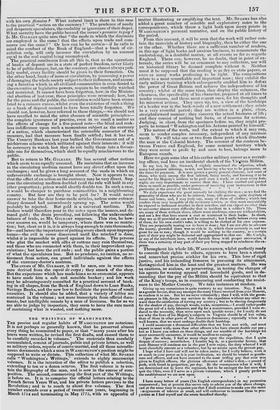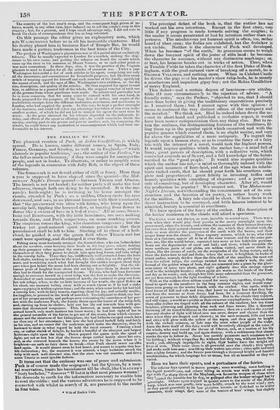THE WRITINGS OF WASHINGTON.
TEE precise and regular habits of WASHINGTON are notorious. It is not perhaps so generally known, that he preserved almost every thing he committed to paper, or that " many years after his leters were written, he revised the first drafts, and caused them to be carefully recorded in volumes." The materials thus carefully accumulated, consist of journals, public and private letters, as well as military orders, reports of courts-martial, and all those miscella- neous documents which a man in WASHINGTONS position might be supposed to write or dictate. This collection of what Mr. SPARKS calls " Washington's Writings," extends to eighty manuscript volumes. It is the intention of the editor to publish a selection, extending to ten or a dozen octavos. The first volume is to con- tain the Biography of the man, and is now in the course of com- position. The second, commencing the first part of the Writings, is before us. It is to comprise the official letters relating to the French Seven Years War, and his private letters previous to the Revolution ; and is to reach to about five volumes. The first number extends over a period of twenty-one years, beginning in March 1754 and terminating in May 1775, with an appendix of matter illustrating or amplifying the text. Mr. SPARKS has also added a great number of sensible and explanatory notes to the correspondence, which throw a light both upon many points in WASHINGTON'S personal narrative, and on the public history of the period.
From this account, it will be seen that the work will rather con- tain the materials of history and biography, than be either the one or the other. Whether there are a sufficient number of readers, in this age of light books and anxious business, to remunerate the undertaking, is a doubtful matter, at all events so far as regards England. There can, however, be no doubt, that in point of ex- ternals, the series will be an ornament to any collection, nor will an historical library be deemed complete without it. Neither must it be supposed that the reading is as dry as state papers, or even as many works professing to be light. The compositions relate to a most remarkable and important man ; they exhibit the early military training which subsequently enabled him to defeat the power of Great Britain and achieve the independence of his country ; whilst at the same time, they display the calmness, the clearness, the specificality of his character, prepared at all times to render reasons, and those most cogent ones, for his thoughts and his minutest actions. They open up, too, a view of the hardships of a border war in the back-woods of a new settlement ; they relate to a very eventful period; they arc written in a plain, clear, straightforward manner ; they concern the actual business of life; and they consist of nothing but facts, or of reasons for actions. Judging, in short, from the specimen before us, they might pro- perly be termed " Washington and his Actions painted by himself." The nature of the work, and the extent to which it may run, seem to render samples necessary, independent of any intrinsic merit. We will take one or two from those parts which illustrate the man or the Colonial history. The account of the contests be- tween France and England, for some nominal territory which they were never to profit by and soon to lose, belongs more to European annals. Here we gain some idea of his earlier military career as a recruit- ing officer, and have an incidental sketch of the Virginia Militia.
In my lot, by Mr. Stewart, I slightly mentioned the objection, which many had against inlisting, to wit, not knowing who was to be paymaster, or the times for payment. It is now grown a pretty general clamour, and some of those, who were among the first inlisted, being needy, and knowing it to be usual for his Majesty's soldiers to be paid once a week, or at most every fort- night, are very importunate to receive their due. I have soothed and quieted i them as much as possible, under pretence of receiving your instructions in this
particular at the arrival of the Colonel. * • #
We daily experience the great necessity for clothing the men ; as we find the generality of those who are to be inlisted, loose, idle persons, quite destitute of house and home, and, I may truly say, many of them of clothes ; which last renders them very incapable of the necessary service, as they must unavoidably be exposed to inclement weather in their marches, and can expect rub other than to encounter almost every difficulty that is incident to a soldier's life. There are many of them without shoes, others want stockings, some arc without shirts, and not a few that have scarce a coat or waistcoat to their backs. In short, they are as ill provided as can well be conceived ; but I really believe every man of them, for his own credit's sake, is willing to be clothed at his own expense. They are perpetually teasing me to have it done ; but I am not able to advance the money, provided there was no risk in it, which there certainly is, and too great for me to run ; though it would be nothing to the country, as a certain part of their pay might be deducted and appropriated to that use. Mr. Cal lyle, or any of the merchants here, would furnish them with proper necessaries, if there was a certainty of any part of their pay being stopped to reimburse the ex- pense. Throughout his whole life, WASHINGTON, whilst perfectly ready to concede their rights to others, appears to have been a stanch and somewhat precise stickler for his own. This love of rigid justice, and his unbending firmness in pursuing its attainment, distinguished him in the least and the greatest matters. He was as cautious, as zealous, as persevering, in testing the charges of his agents for wearing apparel and household goods, and in de- manding that the pay of the Militia should be equivalent to that of the King's troops, as in commencing and conducting the resist- ance to the Mother Country. We take instances at random.
Giving up my commission is quite contrary to my intention. Nay, I ask it as agreater favour, than any amongst the many I have received from your Honour,. to confirm it to me. But let me serve voluntarily ; then I will, with the great- est pleasure in life, devote my services to the expedition without any other re- ward than the satisfaction of serving my country ; but to be slaving dangerously for the shadow of pay, through woods, rocks, mountains,—I would rather prefer the great toil of a daily labourer, and dig for a maintenance, provided I were re- duced to the necessity, than serve upon such ignoble terms ; for I really do not see why the lives of his Majesty's subjects in Virginia should be of less value,. than of those in other parts of his American dominions ; especially when it is well known, that we must undergo double their hardship.
I could enumerate a thousand difficulties that we have met with, and must expect to meet with, more than other officers who have almost double our pay; but as I know you reflect on these things, and are sensible of the hardships we must necessarily encounter, it would be needless to enlarge. • * •
Upon the whole, I find so many clogs upon the expedition, that I quite despair of success ; nevertheless, I humbly beg it, as a particular favour, that your Honour will continue me in the post I now enjoy, the duty whereof I will most cheerfully execute as a volunteer, but by no means upon the present pay. I hope what I have said will not be taken amiss ; for I really believe, were it as much iny' our power as it is your inclination, we should be treated as gentle- men and officers, and not have annexed to the most trifling pay that ever was given to English officers, the glorious allowance of soldier's diet,—a pound of pork, with bread in proportion, per day. Be the consequence what it will, I am determined not to leave the regiment, but to be amongst the last men that quit the Ohio, even if I serve as a private volunteer, whirls I greatly prefer to the establishment we are now upon.
• • * • I have many letters of yours (his English correspondents) in my possession unanswered ; but at present this serves only to advise you of the above change, and at the same time to acquaint you that I shall continue to make you the same
alignments of tobacco as usual, and will endeavour to increase them in pro- yortion as I find myself and the estate benefited thereby.
The scarcity of the last, year's crop, aed the consequent high prices of W- ham', would, in any other case, have induced me to sell the estate's crop in this country; but, for a present, and I hope small advantage only, I did not care to break the chair, of correspondence that has so long subsisted.
On this passage the editor gives an explanatory note, which Sets WASHINGTON before us in all his mercantile exactness. Had his destiny placed him in business East of Temple Bar, he would have made a pattern tradesman in the best times of the City. The product of Washington's plantations was at this period almost exclusively tobacco. This he usually exported to London fur a market, making the ship- smuts in his own name, and putting the tobacco on board the vessels which came up the river to his mansion at Mount Vernon, or to such other point as was moat convenient. lu those days, also, it was the practice of the Virgiuia planters to send to London fur all the articles of common use. Twice a year Washington forwarded a list of such articles to his agent, comprising not only all the necessaries and conveniences for household purposes, but likewise every article of wearing apparel for himself and each member of his family, specifying the names of each, and the ages of Mrs. Washington's two children, as also the size, description, and quality of the articles. Ile then required his agent to send him, in addition to a general bill of the whole, the original voucher of each one of the persons from whom purchases were made. Su minute and particular was he iu these concerns, that for many yeats he entered with his own band, in books prepared for the purpose, all the long lists of orders, and copies of the multifarious receipts from the different tradesiiien, merchants, and mechanics iu London, who had supplied the goods. In this way, lie kept a perfect oversight of the business, and could tell when any advantage was taken of him even in the smallest matter, of which he did not fail to remind his ageut the next time he wrote. As the price obtained for his tobacco depended on the judgment, fi- delity, and efforts of the agent in effecting sales, lie would sotnetimes divide the agency, sending part to one person and part to another, and, by comparing the results, lie could detect any inattention or misniauagetueut which had been un- favourable to his interest.





















 Previous page
Previous page